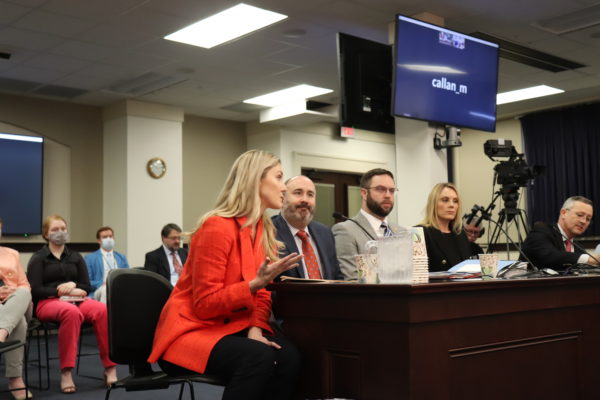February 21, 2022 12:34pm
GLI testifies in support of local tax flexibility
On Thursday, House Bill 475 passed out of the House Elections, Constitutional Amendments and Intergovernmental Affairs Committee. The measure, sponsored by Rep. Michael Meredith (R-19), would allow the General Assembly to modernize local tax structures in the Commonwealth, which is a top priority for GLI this session.
Shelby Williams Somervell, GLI’s vice president of government affairs and communications, testified in committee along Rep. Meredith and representatives from Kentucky League of Cities, Kentucky Association of Counties, and Commerce Lexington. “We need to build a more competitive local tax structure to support economic growth, promote business development, and attract and retain top talent,” said Somervell in her testimony. “Taking this first step in passing a constitutional amendment will give the General Assembly the opportunity to rethink and recreate local taxation in the Commonwealth.”

Shelby Williams Somervell, GLI’s vice president of government affairs and communications, testifying in support of House Bill 475.
Currently, Section 181 of the Kentucky Constitution limits the types of taxes local governments can impose. Most cities and counties rely heavily on occupational and property taxes. Occupational taxes in Louisville make up 57% of the city’s operating budget.
If approved by both chambers, the measure would be put on the ballot for Kentucky voters to decide during the November 2022 general election.
House Bill 476, a companion bill to HB 475, was approved by the House Local Government Committee on Wednesday. HB 476 would apply if voters pass the constitutional amendment on the ballot and would ensure the status quo regarding local taxes until the General Assembly authorizes changes during the 2023legislative session.
Both HB 475 and HB 476 are slated for third and final reading in the House on Tuesday, February 22. GLI encourages swift passage of these bills which will lead to much needed population and industry growth to make the Greater Louisville region more competitive with peer markets and to make Kentucky more competitive with its surrounding neighbors.

